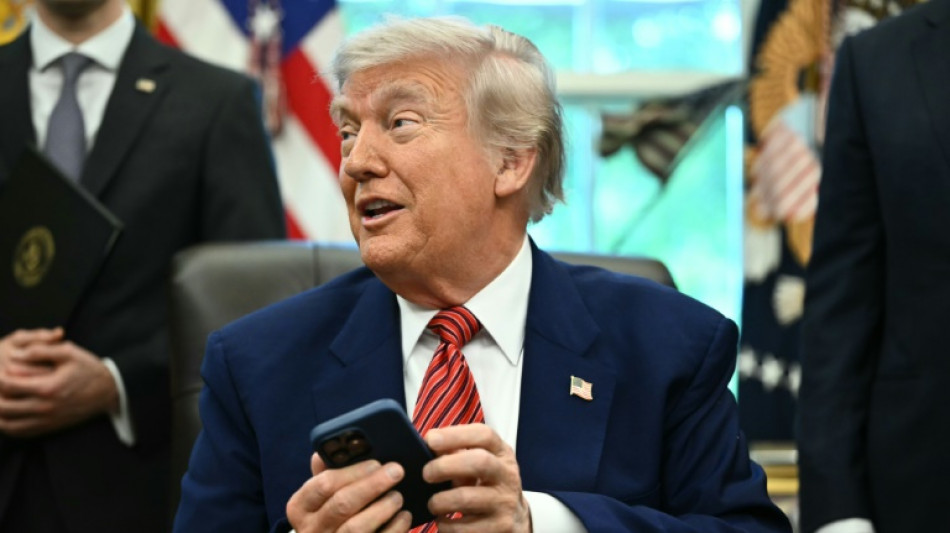
Trump fires new 50% tariff threat at EU, targets smartphones

US President Donald Trump rekindled his trade war with the European Union Friday as he insisted he would slap a 50 percent tariff on the bloc because talks with Brussels were "going nowhere."
Trump also unleashed a separate broadside against smartphone makers including US tech giant Apple, threatening them with new duties of 25 percent if they do not move their production to the United States.
Stock markets fell as the Republican's comments rekindled fears of global economic disruption, after a relative lull in recent days after Trump reached deals with China and Britain.
Trump first threatened the EU tariffs in an early morning post on his Truth Social network.
"Our discussions with them are going nowhere!" Trump said. "Therefore, I am recommending a straight 50 percent Tariff on the European Union, starting on June 1, 2025."
He doubled down later in the day, telling reporters in the Oval Office that there was nothing the 27-nation bloc could do to change his mind.
"I'm not looking for a deal. I mean, we've set the deal. It's at 50 percent," Trump said. "They haven't treated our country properly. They banded together to take advantage of us."
Billionaire property tycoon Trump, 78, also denied that his tariffs would hurt American businesses.
"They’re not hurting, they're helping," he said.
- 'Enormously disappointing' -
Trump's new tariffs would, if imposed, dramatically raise Washington's current baseline levy of 10 percent, and fuel simmering tensions between the world's biggest economy and its largest trading bloc.
European leaders reacted with dismay to the US president's announcement.
Irish Prime Minister Micheal Martin called Trump's announcement "enormously disappointing," writing on X that "tariffs are damaging to all sides."
French trade minister Laurent Saint-Martin said his country's position was "de-escalation, but ready to respond."
An EU spokesperson declined to comment, saying there was a pre-planned call later in the day between EU Trade Commissioner Maros Sefcovic and US Trade Representative (USTR) Jamieson Greer.
In a separate message posted Friday that also unnerved markets, Trump blasted Apple boss Tim Cook for failing to move iPhone production to the United States despite his repeated requests.
Trump said he had "long ago informed Tim Cook of Apple that I expect their iPhones that will be sold in the United States of America will be manufactured and built in the United States, not India, or anyplace else."
"If that is not the case, a Tariff of at least 25% must be paid by Apple to the U.S."
Trump later stepped up his threats, saying he would hit all smartphones not made in his country.
"It would be also Samsung and anybody that makes that product, otherwise it wouldn't be fair," Trump told reporters, adding that the new tariffs would come into effect from the "end of June."
- Market worries -
Trump imposed sweeping tariffs on most of the world on what he called "Liberation Day" on April 2, with a baseline 10 percent plus steeper duties including a 20 percent levy on the EU.
Markets were thrown into turmoil but calmed after he paused the bigger tariffs for 90 days.
Trump has since claimed some early successes in deals struck with Britain and with China, the world's second biggest economy.
But talks with the EU have failed to make much progress, with Brussels recently threatening to hit US goods worth nearly 100 billion euros ($113 billion) with tariffs if it does not lower the duties on European goods.
US Treasury Secretary Scott Bessent told Bloomberg Television on Friday the lower 10 percent tariff rate was "contingent on countries or trading blocs coming and negotiating in good faith."
Traders were unnerved by Trump's latest salvo against Europe.
Wall Street's main indexes were all down around one percent two hours into trading, with the tech-heavy Nasdaq at one stage losing 1.5 percent before rallying while Apple shares sank 2.5 percent.
Paris and Frankfurt ended with losses of around 1.5 percent, while London's FTSE 100, which initially rose, also ended in the red.
"The administration had kind of hinted that they were considering imposing reciprocal tariffs on countries that weren't negotiating in good faith," Barclays senior US economist Jonathan Millar told AFP.
D.Choi--SG

 London
London

 Manchester
Manchester
 Glasgow
Glasgow
 Dublin
Dublin
 Belfast
Belfast
 Washington
Washington
 Denver
Denver
 Atlanta
Atlanta
 Dallas
Dallas
 Houston Texas
Houston Texas
 New Orleans
New Orleans
 El Paso
El Paso
 Phoenix
Phoenix
 Los Angeles
Los Angeles


